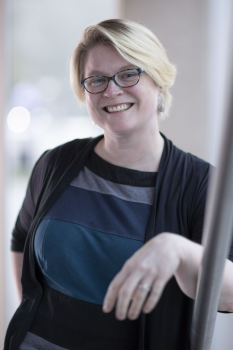Cooperation and Creativity: How Undergraduate Research Thrived during a Covid Summer

When CWRU moved online this spring, engineering undergraduates were faced with the unexpected challenge of rethinking their summer research plans. With the support of their faculty mentors, more than 100 applicants for SOURCE (Support of Undergraduate Research and Creative Endeavors) research funding, including 50 engineering students, realigned their research to transition projects to remote work. The continued generosity of the Case Alumni Association and additional support from Bruce Rakay (ADL’70) enabled SOURCE to fund the majority of the revised projects. Moving into the Fall Semester, SOURCE is working with faculty and staff across departments to develop a menu of workshops focusing on research, professional, and practical skills development.
Mirra Rasmussen, a rising sophomore in EMSE, applied for SURES summer funding to learn how to make cutting edge perovskite solar cells, as part of a joint CSE Faculty Investment Fund project “Fundamental Materials Studies of a Novel Lead Free Perovskite” led by MORE Center Director Dr. Ina Martin and EMSE Associate Professor Jennifer Carter. When challenged to reimagine her project without new experimental work, Mirra refocused the effort to the analysis of historical data, with the goal of creating data analysis platforms and methods for future researchers working with thin films, on this project and others. Passionate about energy and the environment, the move online allowed Mirra to add working with the Office of Sustainability to her project, mapping climate change actions on campus. Mirra noted that “Despite being remote this summer, participating in the SURES program has really taught me a lot about the research experience overall and has given me the opportunity to explore parts of that process that I would not have explored had everything gone to plan. Before this summer, I didn't really have any experience with data analysis or visualization and always thought of myself as more of a hands-on person. Through this project, I not only learned the data analysis programming in R-analytics and combed through datasets, but also learned to enjoy data science and understand its importance across disciplines.”
Similarly, Jonah Bachman, a rising junior in EMAE, received SOURCE funding for efforts to understand degradation pathways in additively manufactured materials for dental prosthetic applications. He was able to pivot to a project foundational to Prof. Carter’s NSF CAREER program (1552716), incorporating physics-based mathematics with the statistics-based models of processing-structure-performance of Copper alloys for reusable rocket engines. Decoupling the data collection process from the data science educational process, Jonah has been working this summer from his home in Newton, Massachusetts, ingesting heritage data that is organized in a human-searchable format into a computer-searchable format and learning how to conduct data visualization in R-analytics.
This summer's undergraduate research experience has shown us the myriad ways that undergraduates can participate in research projects without being in the laboratory: working with historical data sets, learned programming languages to simulate data across platforms, and honing their literature researching skills. This challenge resulted in an opportunity to master skills that often come later in the research process, including scientific communication, effective time management, and the independence of thought that comes with creating their own research structure for the summer. We continue to be impressed by the abilities and focus of our students, and by the many creative ways PIs are working with undergraduate researchers. Assistant Professor Christine Duval (Chemical and Biomolecular Engineering) is mentoring two SOURCE students, and noted that “My students are working well remotely and are engaged! Even though the work is remote, they seem to be happy to be doing non-classroom work online. We have three meetings throughout the week (individual research, group research meeting and a summer book club). I think our meeting structure helps them set a schedule while giving them autonomy in between.” This summer has shown us that we can excel at working as a team and training this upcoming generation of researchers, even via a computer screen.

